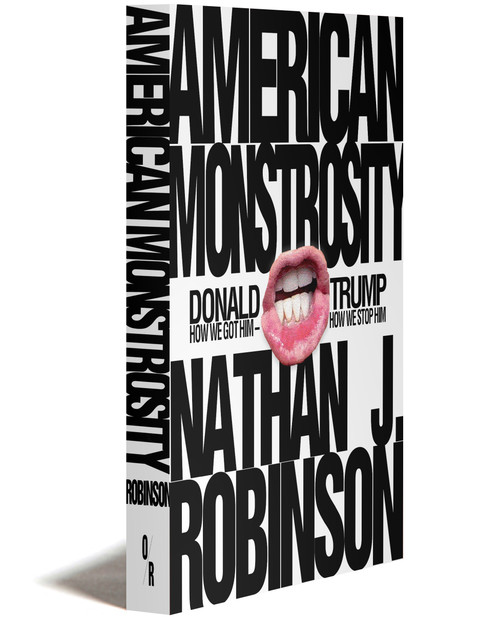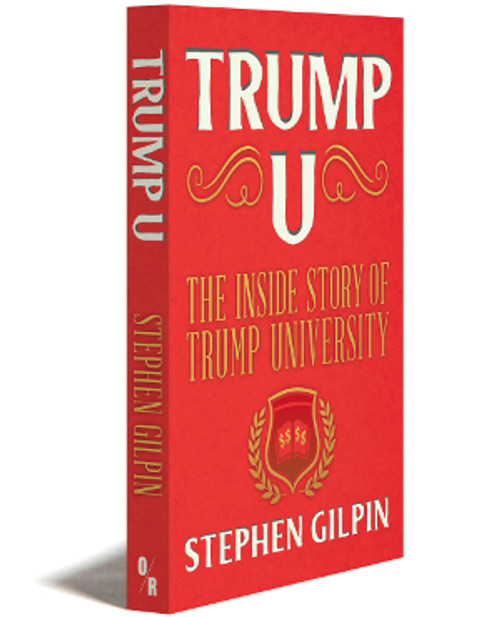American Monstrosity
“Lucid and provocative.”
—Noam Chomsky“An important breath of fresh air.”
—Adolph Reed, Jr.“Consistently excellent, writing at a very high standard.”
—Glenn Greenwald“One of the clearest, most insightful writers working today.
—Ryan Cooperabout the bookabout
Nathan J. Robinson has emerged in recent years as one of the most eloquent and engaging voices in a new cohort of young left-wing commentators who are transforming the American media landscape. Here he sets his unsparing gaze on the greatest grotesquery in an American political system that is lurching out of the control of all but the super-rich: Donald J. Trump.
This substantially revised and expanded edition of his earlier Trump: Anatomy of a Monstrosity brings the story up-to-date, complementing an excellent analysis of how the Trump presidency came into being with a survey of its baleful achievements, a record of unrivalled venality tempered only by incompetence. And, in examining the Trump era with equal measures of wit and intelligence, Robinson points the way to how we can banish the monster from our midst.
About The Author / Editor
Preview
WHAT DOES TRUMP STAND FOR?
In one sense, "What does Donald Trump stand for?"" is a question without an answer. If we are trying to figure out what Trump believes, we will have a difficult time. Trump’s inner core is inscrutable, even to himself. Reading his books is not much of a help; Trump himself appears to have a very limited role in actually writing them (Tony Schwartz, who ghostwrote The Art of the Deal, says Trump had no hand whatsoever in the writing process, and limited himself to spending "a couple of hours" reading a draft of the book once Schwartz had completed it.) And so much of Trump's public persona is cultivated. As he puts it: I've read stories in which I'm described as a cartoon... A comic book version of the big-city business mogul with the gorgeous girlfriend and the private plane and the personal golf course.... My cartoon is real... I am the creator of my own comic book, and I love living in it.
By trying to understand what Trump "stands for", then, we are more interested in asking: "What does Donald Trump represent?" It's less fruitful to look at what he himself thinks he signifies than to look at what he does, in fact, signify. Trump, for example, would think he stands for the tasteful and elegant rather than the gilded and schlocky. He would think he stands for the humble and cautious rather than the egotistical and erratic. But his thinking it does not make it so. More productive than trying to figure out what makes Trump tick is understanding the philosophy that he has publicly espoused, the character that he has created and foisted upon us all. That character is "Donald Trump" the "comic book" super-mogul. Since the 1980's, his name has been synonymous with the ostentatious display of riches, the totally shameless embrace of an ideology of self-love and self-enrichment.
The Trump philosophy of life is simple: life is a competition. The one who gets rich wins. The ones who don't lose. It's a world of winners and losers, and Trump wants to be a winner. Wealth therefore measures worth. And to Trump, there's nothing wrong with bragging about those riches, if you've got them. Besides, perhaps, Ayn Rand (who wore a gold brooch in the shape of a dollar sign), perhaps nobody has ever so openly promulgated a philosophy of wealth, selfishness, and competition.
in the media
American Monstrosity
“Lucid and provocative.”
—Noam Chomsky“An important breath of fresh air.”
—Adolph Reed, Jr.“Consistently excellent, writing at a very high standard.”
—Glenn Greenwald“One of the clearest, most insightful writers working today.
—Ryan Cooperabout the bookabout
Nathan J. Robinson has emerged in recent years as one of the most eloquent and engaging voices in a new cohort of young left-wing commentators who are transforming the American media landscape. Here he sets his unsparing gaze on the greatest grotesquery in an American political system that is lurching out of the control of all but the super-rich: Donald J. Trump.
This substantially revised and expanded edition of his earlier Trump: Anatomy of a Monstrosity brings the story up-to-date, complementing an excellent analysis of how the Trump presidency came into being with a survey of its baleful achievements, a record of unrivalled venality tempered only by incompetence. And, in examining the Trump era with equal measures of wit and intelligence, Robinson points the way to how we can banish the monster from our midst.
About The Author / Editor
Preview
WHAT DOES TRUMP STAND FOR?
In one sense, "What does Donald Trump stand for?"" is a question without an answer. If we are trying to figure out what Trump believes, we will have a difficult time. Trump’s inner core is inscrutable, even to himself. Reading his books is not much of a help; Trump himself appears to have a very limited role in actually writing them (Tony Schwartz, who ghostwrote The Art of the Deal, says Trump had no hand whatsoever in the writing process, and limited himself to spending "a couple of hours" reading a draft of the book once Schwartz had completed it.) And so much of Trump's public persona is cultivated. As he puts it: I've read stories in which I'm described as a cartoon... A comic book version of the big-city business mogul with the gorgeous girlfriend and the private plane and the personal golf course.... My cartoon is real... I am the creator of my own comic book, and I love living in it.
By trying to understand what Trump "stands for", then, we are more interested in asking: "What does Donald Trump represent?" It's less fruitful to look at what he himself thinks he signifies than to look at what he does, in fact, signify. Trump, for example, would think he stands for the tasteful and elegant rather than the gilded and schlocky. He would think he stands for the humble and cautious rather than the egotistical and erratic. But his thinking it does not make it so. More productive than trying to figure out what makes Trump tick is understanding the philosophy that he has publicly espoused, the character that he has created and foisted upon us all. That character is "Donald Trump" the "comic book" super-mogul. Since the 1980's, his name has been synonymous with the ostentatious display of riches, the totally shameless embrace of an ideology of self-love and self-enrichment.
The Trump philosophy of life is simple: life is a competition. The one who gets rich wins. The ones who don't lose. It's a world of winners and losers, and Trump wants to be a winner. Wealth therefore measures worth. And to Trump, there's nothing wrong with bragging about those riches, if you've got them. Besides, perhaps, Ayn Rand (who wore a gold brooch in the shape of a dollar sign), perhaps nobody has ever so openly promulgated a philosophy of wealth, selfishness, and competition.








